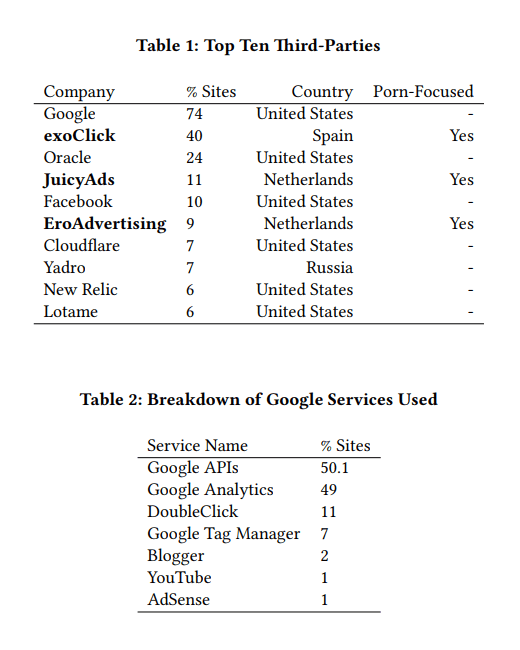
The influence of Google and Facebook is more than what it seems.
Both companies use trackers that can be found on almost every website on the internet. And here, researchers from Microsoft, Carnegie Mellon University, and University of Pennsylvania, found that the trackers are also found on porn websites, in which private browsing incognito mode won't save users.
On their study titled Tracking sex: The implications of widespread sexual data leakage and tracking on porn websites, the researchers said that 93% of adult content websites are leaking sensitive user data to third parties.
To come into this conclusion, the researchers analyzed 22,484 porn websites to examine how they use tracking software to log visitors' browsing tendencies and preferences.
The researchers analyzed third-party scripts on porn websites, and found that Google’s advertising subsidiary DoubleClick had been implemented on 74 percent of them.
Tracking software developed by Oracle and Facebook, which actually bans explicit contents, was found on 24 and 10 percent of the scanned sites, respectively.
In total, the study identified 230 companies that track these users, with most of the tracking was done by a small group of major companies, some of which are pornography-specific.
And what make things worse, only 17% of the analyzed samples were encrypted, meaning that a lot of websites harvesting user data are vulnerable to hacks and breaches. And not only that, as the researchers found that about 50% of all porn sites' URLs expose or strongly suggest the identities, sexual orientation, and intimate interests of visitors.

“[T]hese porn domains contain words or phrases that would likely be generally understood as an indicator of a particular sexual preference or interest inherent in the site’s content,” the researchers say. [T]hese might also likely be assumed to be tied to the user accessing that content.”
Another issue the researchers stressed is that most porn sites lack privacy policies to deal with third-parties. The study found that only 3,856 sites (about 17% of all scanned porn sites) had such policies in place.
“The policies were written such that one might need a two-year college education to understand them,” noted the researchers, highlighting how dense most of those site's privacy terms are.
And even if they do have privacy policy in place, "We have shown the data are often accessed by large corporations, parties usually not identified in porn site privacy policies as having access to user data," said the researchers.
Despite these risks, maintaining private access to online porn is crucial for all, because "Porn often serves educational, exploratory and liberatory – or ‘sex positive’ – outcomes." However, when sexual ‘norms’ are potentially upheld and leveraged by the state or other agents, "every citizen is ultimately at risk of being labeled ‘non-normative’ or pathological".
When asked about the usage of such data, both Google and Facebook told The New York Times that they don’t use data collected from porn sites to create "marketing profiles intended to advertise to individuals.
